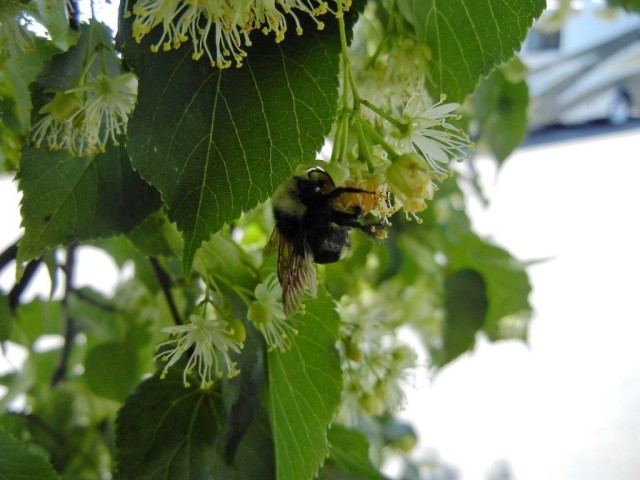National Pollinator Week 2013

An ill-fated bumblebee on an insecticide-poisoned linden tree in Wilsonville, OR
Founded in 2006 by San Francisco’s Pollinator Partnership, National Pollinator Week was marked by the US Senate as an important symbolic step in addressing the urgent issue of declining pollinator populations worldwide.
National Pollinator Week has helped bring much-needed attention to the problems associated with the use of insecticides, habitat destruction and other factors that lead to diminishing populations of pollinating insects.
But still, disasters occur. Even in the Portland area.
This past Monday – ironically, the first day of National Pollinator Week 2013 – tens of thousands of bumble bees and other pollinators were found dead under trees at the Target store in Wilsonville. The Xerces Society, a Portland-based invertebrate conservation organization, sent out an immediate press release and the Oregon Department of Agriculture sent staff to collect samples of the bees and foliage from the trees.
Within 24 hours, the ODA determined that the trees had been sprayed by Dinotefuran (Safari), a systemic insecticide used to combat the aphids that are frequently found on linden, birch and other common street trees.
Unfortunately, said Scott Black, Executive Director of the Xerces Society, “The landscape company did not follow label directions, as it is not supposed to be sprayed during bloom.” This seemingly small mistake led to over 25,000 pollinator deaths – mostly bumble bees – and pollinators continue to flock to the poisoned nectar every day.
Watch CBS News' video coverage of the story.
Currently, the Xerces Society is advocating for bee-proof nets to be used to cover each of the 55 toxic trees until the flowering period is over. This would prevent further pollinator deaths. The Xerces Society’s Facebook page is suggesting that the company that applied this insecticide incorrectly should pay for the nets and for wrapping the trees immediately. Meantime, however, Xerces is working with the City of Wilsonville to buy the nets as quickly as possible.
What's the take-away on this story?
1. Avoid planting trees that attract insects like aphids. Birches and linden commonly attract aphids and result in sticky "honeydew" on cars and walkways below. But plenty of trees don't have this problem.
2. If you do have aphids or other undesirable insects on trees or plants, avoid toxic sprays. Try washing insects off with water or attracting song birds - that eat aphids - to your garden. Or consider removing trees or plants that continuously attract undesirable insects. Alternatively, just live with it. Park your car elsewhere.
3. If you see neighbors - or neighbors' landscape companies - spraying trees, you may just want to know what they are spraying. All the more important if the trees are in flower or about to bloom.
Learn more about how to help pollinators in your own garden by reading this: Three Ways to Help Pollinators in Your Garden. You can also make a difference by planting a garden that feeds pollinating insects - read more here: Designing Your Garden to Support Beneficial Insects. Dig in deeper by exploring the Xerces Society website, especially their sections on insecticides.




